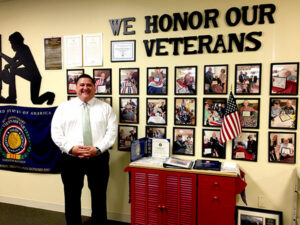By Barbara Allen, Contributing Writer

Photo/submitted
Marlborough – As volunteer coordinator for MetroWest Hospice in Marlborough, Michael Del Vecchio is always on the lookout, always recruiting for that special person who has a true passion for giving of themselves and brightening the lives of others, especially those who are terminally ill.
“I’m looking to build a compassionate, friendly team of volunteers who want to give back to their community,” he said.
Del Vecchio is recruiting for the MetroWest and surrounding areas – north to south, from Acton to Uxbridge; east to west, from Dover to Millbury.
For those not familiar with hospice, there are often misconceptions, said Del Vecchio. The most common being that, once a patient agrees to receive hospice services, their life will come to a quick end. This, he noted, is not always the case. While the hospice patient must be in the later stages of their illness to receive services, their life is by no means over. Under hospice care, with their pain and anxiety under control, patients can have a better quality of life. Del Vecchio pointed out that there are studies which show that hospice patients often live longer at their lives’ end than those not receiving hospice care.
The hospice volunteer supports the patient wherever they are on their journey toward life’s end. Even one hour a week can provide a meaningful experience for both the hospice patient and the volunteer.
“We develop a relationship with the patient, with the family and the caregiver,” explained Del Vecchio. “We walk into their life and brighten their day.”
Hospice volunteer Caitlin Ridgewell agreed.
“These are some of the most vulnerable people for us to help, to spend time brightening their day.”
Prior to coming on board as a volunteer, potential candidates must go through same interview and screening process as do paid employees, which includes the provision of references, a thorough, two-step background check and a tuberculosis test. Once they have been approved for work, new volunteers are required to complete a comprehensive training program.
There are three different levels of volunteering: direct, indirect and bereavement. Direct volunteers, as their name indicates, support the patient directly. Although they are not permitted to provide personal care, feed the patient or help with medications, direct volunteers offer support and companionship through pet or music therapy, reading, doing puzzles, crafts or simply with their quiet presence.
Indirect volunteers provide services which benefit the hospice patient, but without personal patient involvement, such as knitting or crocheting blankets or creating “Chart a Life” posters (personalized story boards which celebrate the life and interests of the hospice patient).
Lastly, bereavement volunteers offer emotional support: attending funerals, participating in memorial services, responding to prayer calls, helping with bereavement mailings and providing a source of comfort and support to the bereaved family member.
Del Vecchio noted that volunteering is not only beneficial for the patient but for the volunteer as well.
“It’s a two-way street,” he added. “You feel the goodness come back to you; you can’t wait to visit again.”
MetroWest Hospice is part of Amedisys, a leading health care at home company, delivering personalized home health, hospice and personal care. To learn more about the company, visit www.amedisys.com. To learn more about becoming a hospice volunteer, contact Volunteer Coordinator Michael Del Vecchio at 508-266-8290.












